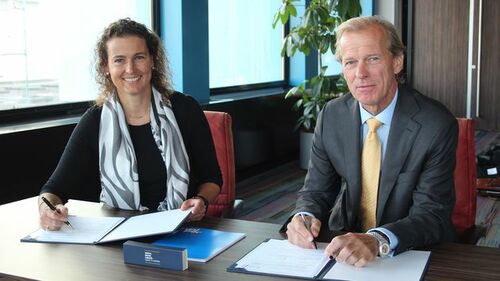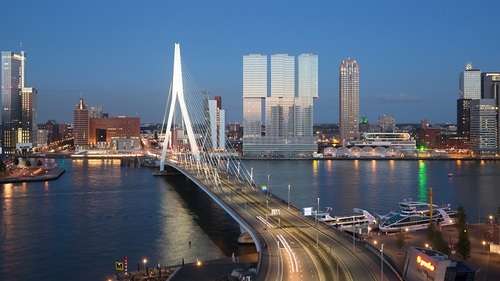Cooperation Uniper and Port of Rotterdam Authority in production green hydrogen
Energy company Uniper and the Port of Rotterdam Authority have entered into an agreement for developing the production of green hydrogen at the Uniper location on Maasvlakte. These plans build on the findings of a recent feasibility study and are in line with the new hydrogen infrastructure that has been planned and the growing demand for sustainable hydrogen from the Rotterdam petrochemical industry.
This agreement has been laid down in a memorandum of understanding (MOU) and is a major milestone in the further development of the hydrogen value chain in the Rijnmond region. No less than half of all Dutch IPCEI* hydrogen projects are developed in Rotterdam. This Uniper project is on the Dutch IPCEI shortlist as well.
The recently completed joint feasibility study shows that the Uniper location on Maasvlakte is ideally suitable for large-scale production of green hydrogen with the use of power generated by North Sea wind farms. The Uniper hydrogen plant is to be connected to the HyTransport.RTM pipeline that runs through the Port of Rotterdam. The pipeline also connects the Uniper plant to the national hydrogen infrastructure and the Delta Corridor pipeline bundle. The latter project is intended for delivering hydrogen to chemical clusters in Moerdijk and Geleen (Chemelot) and farther away in North Rhine-Westphalia.
Towards carbon neutrality
Hydrogen is currently produced from natural gas, the co-called grey hydrogen, resulting in CO2 emissions that amount to 19 million tonnes in the Netherlands. Industry in the Rotterdam area annually consumes about 77PJ of hydrogen (roughly 40% of the total hydrogen consumption in the Netherlands). The transition from grey hydrogen to sustainable green hydrogen in the Rotterdam industry for producing cleaner fuels and as a raw material in the chemical sector is a major step towards carbon neutrality. In combination with importing sustainable hydrogen, sufficient storage capacity, and a national and international hydrogen transport network this may lead to phasing out the production of grey hydrogen altogether.
The next key step in the Uniper project is the FEED (front-end engineering & design) study. This nine-month study is currently being contracted out and should yield in-depth findings for the conceptual design of the electrolysis installation (100MW initially and with a future capacity increase to 500MW), the project planning, and a realistic budget. With the help of these findings the first phase of this unique electrolysis plant can be outsourced to a number of specialist suppliers and contractors.
Soon, the first efforts will be made to apply for the permits needed, to seek (financial) support from various authorities, to enter into agreements with the relevant partners involved in the value chain, and to prepare an investment decision in 2022.
Major link in the new European hydrogen value chain
‘We have the strong ambition to convert our Maasvlakte location into a major link in the new European hydrogen value chain in close collaboration with the Port of Rotterdam Authority and other partners,’ says Yolande Verbeek, director of Uniper Benelux. ‘There is a host of opportunities, not only for Uniper but also for other players in the chain. Together we can use sustainable hydrogen to reduce CO2 levels in Rotterdam significantly.’
The Port of Rotterdam is an energy hub for Western Europe. Today, about 13 percent of the European energy supply enters the European Union via Rotterdam. The port has the ambition to be carbon neutral by 2050 while retaining its central role in the European energy system. By then, according to expectations of the Port Authority, approximately 20 tonnes of hydrogen will flow through the port to consumers in the Netherlands and beyond.
‘The industry has to go through a massive change in making its business processes more sustainable,’ says Allard Castelein, CEO of the Port of Rotterdam Authority. ‘Hydrogen will play a central role in this process. We are working with partners towards the introduction of a large-scale hydrogen network across the port complex, making Rotterdam an international hub for hydrogen production and import and for the transit of hydrogen to other countries in Northwestern Europe. This explains why initiatives like this Uniper project are so important for the future of Rotterdam and the Netherlands.’
*) IPCEI is short for ‘Important Project of Common European Interest’, a European scheme under which countries can provide extra support for projects.
**) HyWay27 report, PwC/Strategy&, June 2021
Categories
Investments
2020-01-01
at Port of Rotterdam (NL)Countries
Companies
Latest news
Momentum Global Ventures completes Series B investment in Perpetual Next to €200 million
Chemical Cluster Delfzijl →Momentum Global Ventures will complete its Series B Investment of €200 million in Perpetual Next, the leading developer of biocommodity production sites (primarily biomethanol).
INEOS launches €250m investment supported by the French Government to secure the future of French industry at Lavera
The project marks the first phase of a long-term regeneration plan to reduce emissions, boost reliability, efficiency and competitiveness, with support of the French State.
Hycamite’s technology to decarbonize shipping awarded AiP by industry leader DNV
Kokkola Industrial Park →Hycamite’s proprietary Thermo-Catalytic Decomposition (TCD) technology offers a new approach to producing clean hydrogen by breaking down methane, the primary component of liquefied natural gas (LN...
Clariant catalysts will power the Ecoplanta: Europe's first waste-to-methanol plant
Chemmed Cluster Tarragona →Repsol is building Europe’s first plant to produce renewable methanol from urban waste The facility will use Enerkem gasification technology to produce 240 KTA of methanol Clariant will supply cata...


